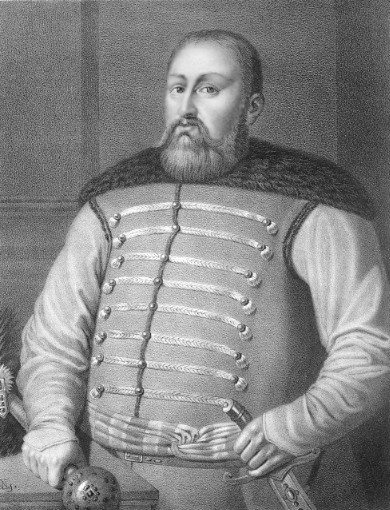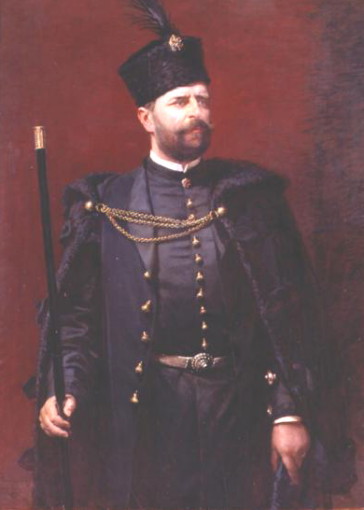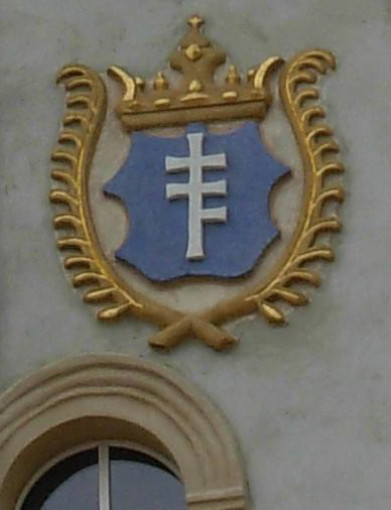Potocki
Potocki. A Polish noble family. It originated in the 14th century in the Cracow region; its name derives from the village of Złoty Potok, near Częstochowa. The family became prominent in the late 16th and early 17th centuries as a result of the patronage of Chancellor Jan Zamoyski and King Sigismund III Vasa and dynastic ties with the Movilă family of Moldavian hospodars. In that period the Potockis became owners of many towns (eg, Brody, Krystynopil, Nemyriv, Stanyslaviv, Zbarazh), hundreds of villages, and huge latifundia in Galicia, Podilia, and Right-Bank Ukraine. Thenceforth they were one of the wealthiest and most influential magnate families in the Polish Commonwealth.
The Potockis played a significant role in Ukrainian history as Polish starostas (eg, of Belz, Halych, Kolomyia, Mostyska, Sambir, Sniatyn, Vinnytsia), voivodes, and military leaders. Jakub (b ca 1554, d 26 January 1613 in Smolensk) was castellan of Kamianets-Podilskyi from 1609 and voivode of Bratslav voivodeship from 1611. His brother, Jan (b ca 1552, d 22 or 25 April 1611), was general of the lands of Podilia from 1592 and voivode of Bratslav voivodeship from 1608; he led an army into Moldavia in 1607 to help his brother-in-law, C. Movilă, ascend the Moldavian throne. Jakub's son Mikołaj Potocki was grand hetman of the Polish royal army; he suppressed the 1637–8 rebellions led by Pavlo Pavliuk and Dmytro Hunia and commanded the Polish army during the Cossack-Polish War of 1648–57. Mikołaj's brother Stanisław (b 1607, d 20 March 1647) was a cavalry colonel and the Polish commissioner for Cossack affairs. Another brother, Andrzej (d before 19 May 1663 in Lviv), was royal quartermaster from 1655 and voivode of Bratslav voivodeship; he commanded the Polish cavalry that aided Hetman Ivan Vyhovsky in 1658–60. Mikołaj's son, Stefan (b ca 1624, d 19 May 1648), was starosta of Nizhyn and a military commander during the Battle of Zhovti Vody. Jakub and Jan's nephew, Stanisław Rewera Potocki, was grand hetman in 1654–67. His son, Andrzej (d 30 August 1691 in Stanyslaviv), was voivode of Kyiv voivodeship (1668–8) and grand hetman (1684–92); he founded the town of Stanyslaviv (now Ivano-Frankivsk) in 1662, defeated the Crimean Tatars at Kalush in 1675, regained a large part of Podilia from Turkey in 1683, and participated in the unsuccessful Moldavian campaigns of Jan III Sobieski in 1684–5. Andrzej's son, Józef (d 17 May 1751), was voivode of Kyiv voivodeship (1702–9) and grand hetman (1735–43); he suppressed the 1703 popular rebellion led by Semen Palii. Józef's son Stanisław (b 1698 near Stanyslaviv, d 8 February 1760) was in charge of defending the Commonwealth's border with the Ottoman Empire from 1738, fortified Stanyslaviv and Kamianets-Podilskyi, and was voivode of Kyiv voivodeship in 1744–6. His brother, Franciszek Salezy (b 1700, d 22 October 1772 in Krystynopil), was voivode of Volhynia voivodeship from 1755 and Kyiv voivodeship from 1756; he owned 70 towns and several hundred villages. Franciszek's son, Stanisław Szczęsny (b 1751 in Krystynopil, d before 15 March 1805 in Tulchyn), was voivode of Rus’ voivodeship (1782–8), general of the royal artillery (1788–92), and marshal of the Torhovytsia Confederacy (1792).
A few Potockis played a role in the economic life of Ukraine. Wincenty (?–1825), the royal chamberlain and a lieutenant general from 1773, applied modern management methods to the numerous enterprises he created in Nemyriv. Antoni Protazy (aka Prot, b 11 September 1761, d 1801), a Warsaw banker and the owner of Chudniv, organized several factories in the village of Makhnivka, near Berdychiv, directed the Polish Black Sea Trading Company, and ran an import-export business in Russian-ruled Kherson. Writers Wacław Potocki and Jan Potocki reflected Ukrainian realities in their literary and scholarly works.
Under Austrian rule three Potockis distinguished themselves in Galician politics: Count Adam (b 24 February 1822, d 15 June 1872), a proponent of Polish-Ukrainian co-operation, Galician autonomy, and the transformation of the Austrian Empire into a federated state; Count Alfred (b 29 July 1822, d 18 May 1889), the Austrian minister of agriculture (1867–70), prime minister (1870–1), and viceroy of Galicia (1875–83); and his son, Andrzej Potocki, the viceroy of Galicia (1903–8).
Arkadii Zhukovsky
[This article originally appeared in the Encyclopedia of Ukraine, vol. 4 (1993).]

.jpg)
.jpg)

